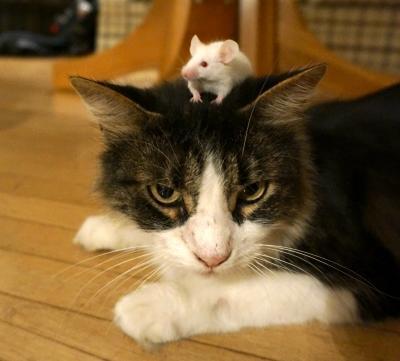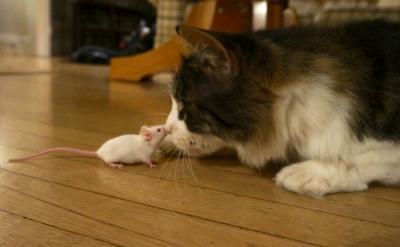Chronic infection with the parasite Toxoplasma gondii can make mice lose their innate, hard-wired fear of cats. This loss of their innate fear may persist after the parasite is no longer detectable in their brains, suggesting that initial infection may cause permanent changes in the mechanisms underlying their fear of predators. The results are published September 18 in the open access journal PLOS ONE by Wendy Ingram and colleagues from the University of California, Berkeley.
Even after infection with Toxoplasma has been removed from rodents' brains, they continue to behave as if unafraid of the smell of cat urine, suggesting that the infection causes long-term changes in the brain. Previous studies have suggested this persistent behavioral change may be due to brain inflammation or parasite cysts within brain cells. In this study, the researchers found that this lack of fear persisted even when inflammation markers or cysts could not be detected in mice. Based on experiments with low-virulence strains of Toxoplasma and exposing mice to the parasites over a long period of time, the authors suggest that the lack of fear occurs within the first three weeks of infection. The behavioral change persists even in the absence of parasite cysts and brain inflammation, suggesting a different mechanism may be responsible, such as proteins injected by the parasite into host cells. Ingram elaborates, "It is remarkable that even after the infection has been largely or completely cleared, a profound behavioral change persists. Simply having a transient infection resulting in what is potentially a permanent change in host biology may have huge implications for infectious disease medicine."

Even after infection with Toxoplasma has been removed from rodents' brains, they continue to behave as if unafraid of the smell of cat urine, suggesting that the infection causes long-term changes in the brain.
(Photo Credit: Wendy Ingram and Adrienne Greene)

Researchers found that mice's lack of fear of cats persisted even when inflammation markers or cysts could not be detected in mice.
(Photo Credit: Wendy Ingram and Adrienne Greene)

The loss of mice's innate fear may persist after the parasite is no longer detectable in their brains, suggesting that initial infection may cause permanent changes in the mechanisms underlying their fear of predators.
(Photo Credit: Wendy Ingram and Adrienne Greene)
Source: Public Library of Science